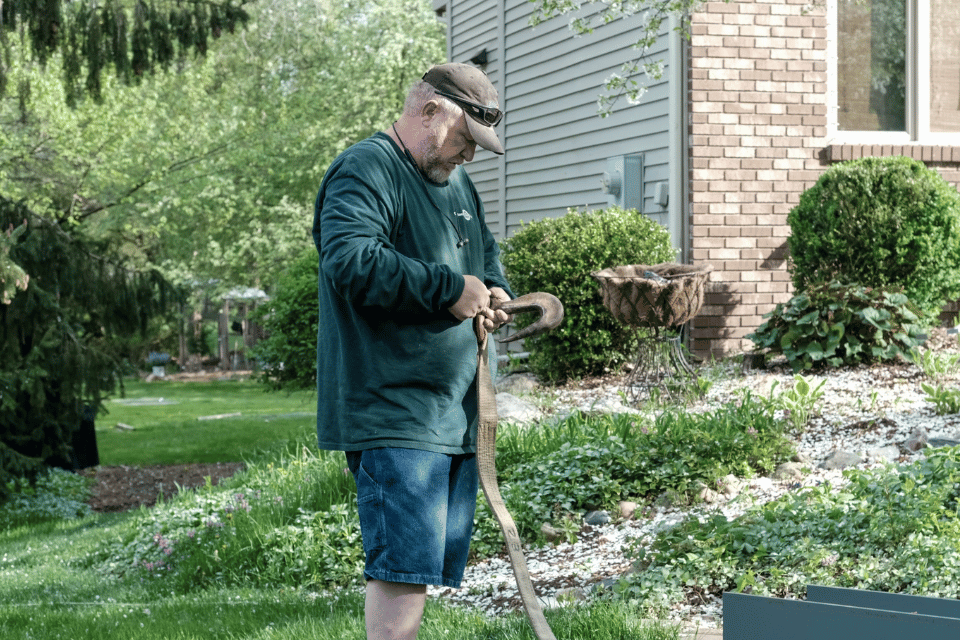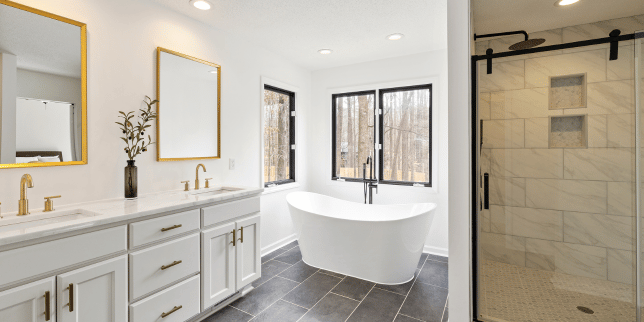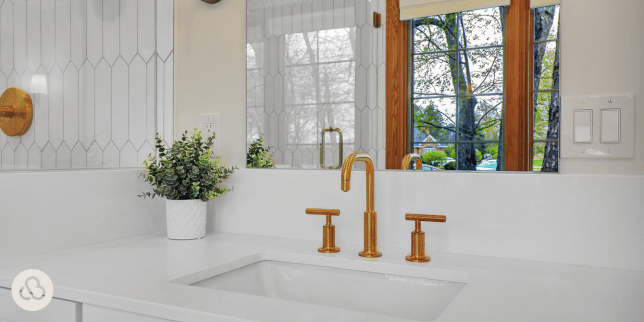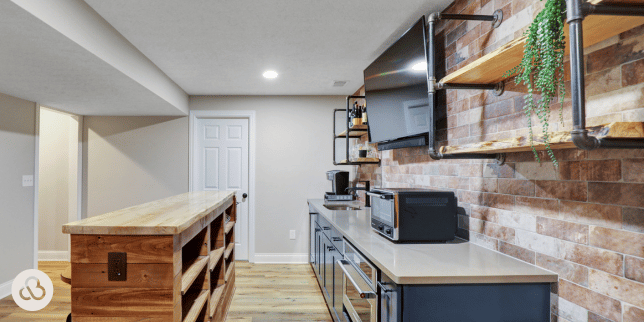7 Questions You Should Ask About Your Contractor’s Warranty Process
December 20th, 2024
5 min read

Planning a home remodel can be exciting, but it can also bring concerns about long-term durability and the reliability of your contractor’s warranty process. After all, a remodel is a big investment, and you deserve assurance that any potential issues down the road will be addressed efficiently and professionally.
At Custom Built, we know that clear, dependable warranties are key to providing peace of mind during any remodeling project. With over 20 years of experience, we’ve structured our warranty process to focus on transparency, timely responses, and quality solutions for our clients in the Greater Lansing area.
In this article, we’ll cover the seven essential questions you should ask to understand your contractor’s warranty thoroughly so you can feel confident that your remodel will stand the test of time:
- What Types of Warranties Do You Offer?
- How Long Does Each Warranty Last?
- What Is the Process for Filing a Warranty Claim?
- Are There Any Exclusions or Limitations?
- What Is Covered Under the Warranty, and What Isn’t?
- How Are Repairs Handed if a Product Fails?
- Who Will Perform the Warranty Work?
1. What Types of Warranties Do You Offer?
Reliable contractors typically offer two types of warranties: manufacturer warranties and workmanship warranties. Manufacturer warranties cover the materials used, while workmanship warranties cover the installation. If a contractor lacks clear warranty options, that could be a red flag.
For example, if a deck board warps due to manufacturing defects, a good contractor’s manufacturer warranty should replace the board. But, a strong workmanship warranty ensures you’re protected if installation issues cause the problem. Asking upfront helps you understand exactly who will handle potential fixes.
2. How Long Does Each Warranty Last?
Understanding warranty timeframes is crucial when choosing a contractor. In Michigan, many reputable contractors provide a two-year workmanship warranty—the state minimum—but others may offer longer periods.
However, not all extended warranties are created equal. Some contractors may promise long warranties without budgeting for potential repairs, while others might close and reopen under a different name, leaving their warranties invalid. That’s why it’s essential to work with a company you can trust.
3. What Is the Process for Filing a Warranty Claim?
Whether a simple fixture replacement or a complex repair, the warranty claim process should be clear and straightforward. Contractors typically batch warranty claims to maximize efficiency unless it’s an urgent issue, such as a gas leak.
Here’s an example: A cracked drywall seam requiring attention from two trades, along with a front door alignment adjustment, may be grouped together for efficiency. This approach minimizes disruption for the homeowner while allowing the contractor to streamline their process. Although repainting and trim carpentry will be involved, batching these tasks reduces warranty and overall costs for the contractor.
When you’ve hired a reputable contractor you can trust, creating access back into the house is much easier knowing that your contractor has quality people that you can trust with your property.
4. Are There Any Exclusions or Limitations?
Before you sign, ask about any limitations. Some warranties only cover specific issues, and some may exclude certain elements, like wear and tear on flooring.
It’s also wise to know what isn’t covered under a warranty. For instance, manufacturer warranties may not include labor costs for replacements. Understanding exclusions helps prevent unexpected costs. Reading the fine print will help you avoid confusion about coverage.
5. What Is Covered Under the Warranty, and What Isn’t?
A strong warranty is only as valuable as the contractor behind it. If a company doesn’t have the budget, team, or stability to honor its promises, even the best warranty won’t hold up.
One way to gauge reliability is by looking at how long the company has been in business—contractors with a long history often have a proven track record of accountability and customer satisfaction. Choosing a contractor with a stable, established reputation ensures your investment is protected for the long term.
For example, brands like Trex have stayed reliable through economic ups and downs, honoring their warranties. When a contractor budgets for warranties and has a strong track record for quick responses, you’re more likely to receive dependable, lasting support.
6. How Are Repairs Handled If a Product Fails?
Understanding how the contractor addresses repairs can be crucial, especially for manufactured items. Ask if the manufacturer’s warranty covers materials and labor. Some warranties only replace the product, leaving you to cover labor costs.
For example, if your countertop develops a crack due to a manufacturing defect, the product might be replaced, but not the labor to reinstall it. Getting clarity on repair logistics and costs helps you avoid potential out-of-pocket expenses.
7. Who Will Perform the Warranty Work?
Find out whether the original contractor team handles the warranty work or if they rely on third-party service providers. A contractor with an established in-house team or network of trusted tradespeople ensures a higher level of quality and consistency, as they know the specifics of your project.
For instance, if a custom cabinet needs a repair, you’d want it handled by someone who understands the craftsmanship and can guarantee a matching finish.
5 Reasons Why It’s Important to Ask Your Contractor About Their Warranty Process
Understanding a contractor’s warranty is essential for safeguarding your investment and ensuring peace of mind throughout the remodeling process. A home remodel is a significant commitment, and asking detailed questions about warranty coverage gives you a clear picture of what to expect if issues arise. Here’s why this step is critical:
1. Clarifies Coverage
Not all warranties are created equal. By asking about warranty specifics, you clarify what is covered (and what isn’t), whether it’s materials, workmanship, or both. For example, a contractor may offer a workmanship warranty that covers installation issues while the product manufacturer handles material defects. Knowing the details helps prevent surprises later, so you’re fully informed on where each responsibility lies.
2. Protects Against Unexpected Costs
Remodeling involves many moving parts, and if something fails—whether it’s a fixture, a deck board, or cabinetry—the repair costs can add up. Asking upfront about warranty details, including coverage length and exclusions, allows you to expect any potential expenses, giving you the chance to budget appropriately. This step is particularly important for high-use areas like kitchens and bathrooms, where wear and tear are common.
3. Reveals the Contractor’s Professionalism and Integrity
A reputable contractor will discuss their warranty, demonstrating transparency and commitment to their clients. Contractors who dodge warranty questions or offer vague answers may lack the professionalism you want in a long-term partner. When a contractor has a well-defined, documented warranty process, it’s a sign they’re committed to their work and confident in the quality of their craftsmanship.
4. Ensures Long-Term Peace of Mind
Understanding the warranty process also gives you peace of mind. You’ll feel more confident knowing that your contractor has planned for aftercare and that they’ll be there if something goes wrong. This assurance is especially valuable in the years following a project when normal wear and tear or product failures might need attention.
5. Helps You Make an Informed Decision
Finally, asking these questions allows you to compare contractors accurately. While some may offer extensive warranties with quick response times, others might provide limited coverage. This information empowers you to select a contractor who aligns with your expectations for support and reliability over the long term.
Taking the time to ask these questions gives you a clearer understanding of your protection and helps you make a sound choice when hiring a contractor for your home remodel.
Next Steps to Hiring Your Remodeling Partner
Asking the right questions about your contractor’s warranty is one of the most effective ways to protect your investment and ensure long-term remodeling satisfaction. Understanding what’s covered, how to make a claim, and what limitations might exist helps you confidently enter your project.
By asking these seven questions, you’ll have a clear view of what to expect and can avoid potential frustrations if issues arise later. A strong warranty process with clear communication is the mark of a contractor committed to quality and client satisfaction.
At Custom Built, we focus on being transparent, supportive, and attentive to your needs—before, during, and long after your project is complete. Our warranty process reflects our commitment to quality workmanship and our clients in the Greater Lansing area.
As you prepare for your remodel, ensure your contractor can confidently address these warranty questions. For a reliable and trusted partner throughout your project, contact Custom Built to learn more about our comprehensive warranty and what it means for your home.
Now that you know more about questions you should ask about your contractor’s warranty process, let’s take a look at why it’s challenging to compare project bids upfront, whether a design-build firm like Custom Built is right for you, and other ways to vet your remodeling partner options:
- 5 Reasons It Is Challenging to Compare Remodeling Contractor Bids Upfront - Discover why comparing contractor bids upfront is often difficult and how to navigate this process properly.
- Top 4 Differences Between a Design-Build Firm and a General Contractor - A comparison between design-build firms and general contractors that highlights the pros and cons that each remodeling company brings to the table.
- Top 8 Questions to Ask Before Hiring a Remodeling Contractor - A list of essential questions to ask your prospective remodeling contractor before hiring them for your project; more questions are included in each section.
Michael brings over 2 decades of building and remodeling experience to his position as the Owner and Visionary of Custom Built. Michael’s passion to make an impact on the home building industry has led him to serve for over ten years at the local and state Home Builders Association, culminating as President of the HBA of Michigan in 2020.
Topics:


























